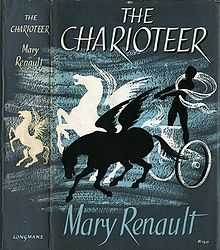The Charioteer
 First edition Cover | |
| Author | Mary Renault |
|---|---|
| Country | United Kingdom |
| Language | English |
| Genre |
War novel Gay literature |
| Publisher | Longman |
Publication date | 1953 |
| Media type | hardback |
| Pages | 399 |
| ISBN | n/a |
The Charioteer is a 1953 war novel by Mary Renault. It was first published in the United States in 1959. The Charioteer is significant because it features a prominent gay theme at an early date and quickly became a bestseller within the gay community.[1]
Plot summary
This romance novel is set in the period of World War II at a military hospital during nightly blackouts and bomb raids. The story's young male protagonist, Laurie 'Spud' Odell, is a wounded soldier from the Dunkirk evacuation (Renault herself worked as a nurse treating Dunkirk evacuees during the war), who must decide if his affections lie with a conscientious objector or a naval officer. The conscientious objector, a Quaker, has not come to terms with his own homosexuality, whereas the naval officer, a friend of Laurie's from school, is sexually experienced and established in the homosexual subculture of the British military. Laurie's confused romantic feelings for the two very different young men are compounded by his own discomfort with the gay lifestyle (dramatized in an extended scene at a gay party, regarded by some critics as a literary tour de force). Through this conflict, Renault explored her own ambivalence about whether homosexuals truly constituted what would come to be seen as a gay and lesbian community. She also explored a religious theme, contrasting the pacifist Christianity of the young conscientious objector with the "exalted paganism" (as one character describes it) of ancient Greece. The novel derives its title from the Chariot Allegory employed by Plato in his dialogue Phaedrus; Renault also alludes to Plato's Symposium, in which a character philosophizes about an army composed of male lovers. The story's wartime setting is crucial to the ethical issues the novel explores. In a sense, The Charioteer is a warm-up for Renault's historical novels. By turning away from the 20th century and focusing on stories about male lovers in the warrior societies of ancient Greece, Renault no longer had to deal with homosexuality and anti-gay prejudice as social "problems"; instead she was free to focus on larger ethical and philosophical concerns while examining the nature of love and leadership.
Reception and critical analysis
Anthony Slide noted that The Charioteer was a bestseller within the gay community.[1] Michael Bronski called the novel "an outright plea for the tolerance of homosexuals" and praised it as "sincere and well-written."[2]
Although The Charioteer was not ranked number among the top 100 gay and lesbian novels compiled by The Publishing Triangle in 1999, it was ranked number 3 out of the site's visitors' top 100 best.[3]
References
- ↑ 1.0 1.1 Slide, Anthony (2003). Lost Gay Novels: A Reference Guide to Fifty Works from the First Half of the Twentieth Century. Routledge. p. 152.
- ↑ Bronski, Michael (2003). Pulp Friction: Uncovering the Golden Age of Gay Male Pulps. New York: St. Martin's Griffin. pp. 359–360.
- ↑ The Publishing Triangle's list of the 100 best lesbian and gay novels
| ||||||||||||||